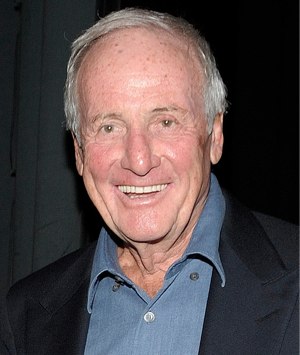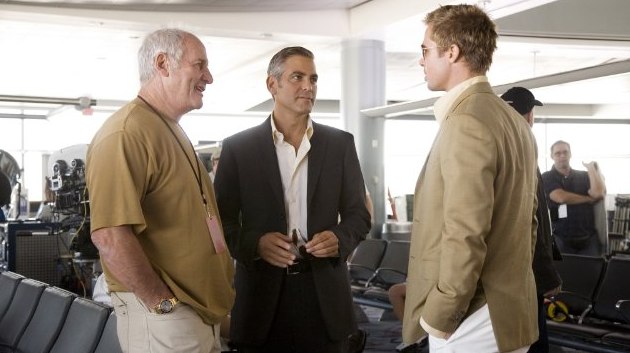
Directed by Douglas McGrath (Infamous, Emma) and spun off in part from Weintraub's 2010 autobiography When I Stop Talking, You'll Know I'm Dead, His Way features a broad passel of subjects -- from Clooney to Roberts to Graydon Carter to president George H.W. Bush -- supplementing Weintraub's own peerless raconteur asides about life, love, ambition and avarice in showbiz. Talking recently with the 73-year-old producer, Movieline asked Weintraub about his philosophy toward handing down lessons from almost 40 years behind the camera.
"A lot of people want me to be a mentor, and I kind of am to certain people," Weintraub said. "But I don't sit down and say to somebody, 'I'm going to be your mentor.' You've got to come to me and ask me to do that. But my book is a textbook. My movie is a textbook. You don't have to be mentored by me at this stage."
Nevertheless, we got in the service-oriented spirit to round out five essential bits of advice for aspiring producers seeking the big time:
1. The Obvious (?)
"The first tip: Go into another business. The second tip..."
2. Never Hear "No"
Weintraub's natural approach to work always comes back to this central tenet. "People don't understand this," he said, "but I started very young, and I became very, very successful at a very young age. By the time I was 26 years old, I was a multimillionaire. And I started with nothing. And I was on the road 10, 11 months a year. I didn't have time to think about what I was doing or why or what the reasons were and so on. I didn't have a business plan like some people have. I had my brain, I had my ears, I had my mouth, and I had my eyes. And I went for it. When I found something I believed in and I cared about and thought I could market and sell and could be thought of creatively -- the most important thing to me -- I did it. If people came up to me and said, 'Are you crazy? This stinks!', I didn't hear them. Never heard 'em.
"I know so many people in the world," Weintraub continued. "I have a very big phone book and a very long reach around the world. And I think -- I don't think, I know -- that 95 percent of the people who I know who weren't born into success who have become successful and done things that are different and made a lot of money and had a lot of excitement in their life are people who never hear the word 'no.'" And when they believe in something, they make it happen. I'm in the middle of projects right now where I hear the word 'no.' Or, 'Things have passed you by.' I don't hear them. [...] If it's all about 'This is the way we do it,' you should go down to Mutual of Omaha and type insurance policies all day, because they have a form, and you fill out the form. If you want to be in the world I live in, which is a creative world with new ideas, then you've got to get away from the norm. You've got to go for it."
3. Keep your talent grounded.
Weintraub has handled megastars on both the music (Sinatra, Presley, John Denver) and movie (Clooney, Roberts, Brad Pitt, Sylvester Stallone) spectrums, adhering to one guiding principle throughout. "They're guys," he said. "I talk to them exactly the same way I talk to you. They talk to me exactly the same way I talk to them. I don't talk to actors or directors or writers or singers like they're children. They're successful people who have something to say, and I help them say it. And I put them in a place where they can get their message out, whatever it is.I never sat down with Elvis Presley or Frank Sinatra and saw this 'star.' They're friends of mine. They're people I worked with -- my colleagues. [...] I require more pampering than they do!"
4. Slow down!
While some might argue that the neverending awards quest compromise how, why and when we see and judge certain films, Weintraub has another theory. "I think what compromises things today is the Internet -- the quickness, the premature ejaculation and such," he said. "Everything has to be done yesterday and not today. You don't have time to think it through because of the technology. When I was a kid and I was making films, it used to take three days to send a piece of film out -- get the negative, send it to the lab, play with it... We do it in a millisecond now. I don't think the creative energy that we put into films in the old days is around now. Once in a while you get a great film like The King's Speech, which is worthwhile and they obviously took their time on. You couldn't rush those actors through that. But you could rush one of those guys in a suit with a patch on it flying over New York. You can rush that."
5. Whether at the box-office or behind bars, listen to your audience.
To Weintraub's previous point, he's not necessarily complaining about Hollywood standards themselves; needless to say, what happens behind studio doors is a lot different than what happens outside them in the culture at large. "The 'business' part of 'show business' means: 'Make what people want to consume,'" he said. "The consumer dictates what's made. They don't realize they do, but they do. And if they go out and spend $500 million watching Batman, they're going to get Superman next. And if they're going to spend another $500 million watching Superman, they're going to get The Green Lantern next. It's a self-fulfilling prophecy. It's the consumer that dictates -- not me, not the studio."
And despite what seems hot now, always be prepared to adapt on the fly. "I went to talked to a bunch of prisoners once -- about 150 prisoners," Weintraub said. "And they were killers and hard-time guys. I started my rap about my movies, and they couldn't give a sh*t about what I was talking about. They didn't care about never hearing the word 'no.' And then somebody yelled out, 'Tell me about Julia Roberts's tits!' So I did a lecture on tits and asses and beautiful movies stars. They loved that! I was a smash!"
